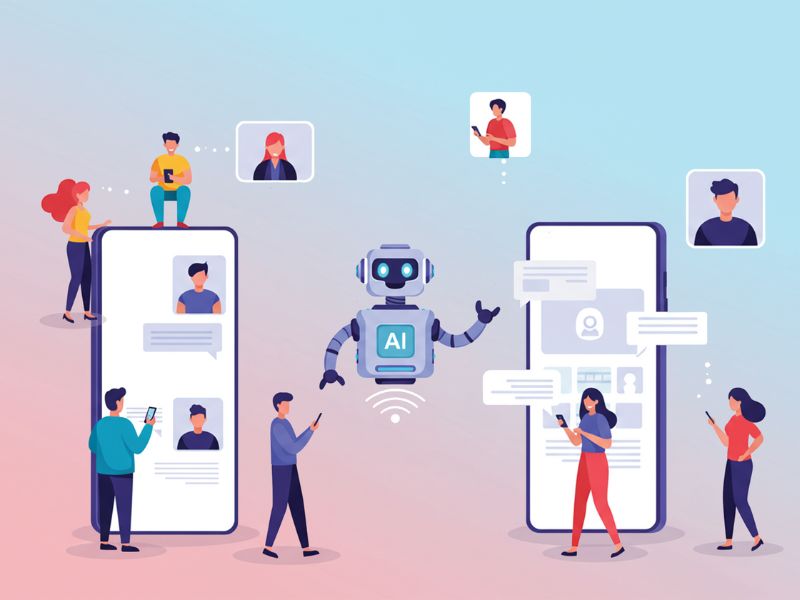Human Creativity + AI Efficiency: The Winning Sales Combo
The Evolution of Sales: From Gut Feelings to Data-Driven Insights
The Value of Human Creativity in Sales
How AI Efficiency Transforms Sales Operations
The Synergistic Power of Human-AI Collaboration
Overcoming Implementation Challenges
Fiidom: Where eCommerce Meets AI Excellence
Conclusion: Embracing the Winning Combination
FAQ
Sarah, a seasoned sales professional, sits across from a potential client who seems hesitant about making a decision. Her years of experience tell her something deeper is troubling this prospect, but she can't quite put her finger on it.
Meanwhile, her AI-powered CRM system has already analyzed thousands of similar interactions and identified three key objection patterns that typically emerge at this stage of the sales process.
Together, Sarah's intuitive understanding and her AI assistant's data-driven insights create a powerful combination that transforms a potentially lost deal into a successful partnership.
This beautiful marriage between human creativity and AI efficiency is the future of sales excellence. The modern sales landscape demands both the irreplaceable human touch and the precision of AI working in perfect harmony.
The Evolution of Sales: From Gut Feelings to Data-Driven Insights

Sales have undergone a big transformation over the past few decades. Traditional approaches relied heavily on charm, persistence, and gut instincts.
Salespeople developed their skills through trial and error, learning to read body language, interpret verbal cues, and navigate complex human emotions.
While these abilities remain invaluable, today's competitive marketplace requires something more sophisticated.
The emergence of AI has introduced unprecedented levels of AI efficiency into sales operations.
Machine learning algorithms can now process vast amounts of customer data, identify buying patterns, predict optimal timing for outreach, and even suggest personalized messaging strategies. This technological advancement doesn't diminish the importance of human creativity; instead, it amplifies what skilled professionals can achieve.
Customer relationship management systems now automatically score leads based on behavioral indicators, email engagement rates, and demographic information.
Sales professionals no longer waste time pursuing unqualified prospects because intelligent systems help them focus their energy on the most promising opportunities.
The Value of Human Creativity in Sales

Despite all technological advances, certain aspects of selling stay uniquely human. Creativity helps us connect with prospects on an emotional level, understand unspoken concerns, and develop innovative solutions to complex business challenges.
When a potential customer expresses doubt about a product's compatibility with their existing systems, creative salespeople don't just recite technical specifications.
They craft stories, draw analogies, and paint vivid pictures of successful implementations that resonate with the prospect's specific situation.
Human creativity also enables adaptability in ways that current AI systems cannot match. While algorithms excel at pattern recognition and data processing, they struggle with the nuanced improvisation required when conversations take unexpected turns.
A skilled salesperson might discover mid-presentation that their prospect's primary concern isn't cost or features, but rather internal politics and change management.
The storytelling aspect of sales particularly showcases human creativity's power. People remember narratives far better than statistics or feature lists.
When salespeople weave customer success stories, industry insights, and personal experiences into their presentations, they create emotional connections that pure data cannot achieve.
These stories are the foundation for trust, which is the cornerstone of every successful sales relationship.
How AI Efficiency Transforms Sales Operations

The integration of AI into sales processes has revolutionized how teams operate, prospect, and close deals. AI efficiency manifests most clearly in lead qualification and prioritization.
Machine learning algorithms analyze countless data points – website behavior, email engagement, social media activity, company news, and more – to determine which prospects are most likely to convert.
Predictive analytics is another area where AI efficiency creates tremendous value. Advanced systems can forecast when existing customers might be ready for upgrades, identify accounts at risk of churning, and predict the optimal timing for renewal conversations.
These insights enable proactive relationship management rather than reactive problem-solving.
Personalization at scale becomes possible through AI efficiency. While human salespeople excel at customizing their approach for individual prospects, AI systems can simultaneously personalize communications for thousands of contacts.
Email campaigns automatically adjust subject lines, content, and send times based on individual recipient preferences and behaviors.
Conversation intelligence tools exemplify how AI efficiency enhances human performance rather than replacing it. These systems analyze sales calls, identify successful conversation patterns, and provide coaching recommendations.
They might notice that deals close more frequently when specific keywords are mentioned or when certain objections are addressed using particular language.
The Synergistic Power of Human-AI Collaboration

The magic happens when human creativity and AI efficiency work together rather than in isolation. This collaboration creates capabilities that neither humans nor machines could achieve independently.
AI systems provide the analytical foundation that informs creative decision-making, while human insight guides AI systems toward more relevant and meaningful outcomes.
AI efficiency can identify hundreds of potential leads based on specific criteria and behavioral indicators.
However, human creativity determines how to approach each prospect in a way that resonates with their unique situation.
The salesperson might notice that a prospect recently published an article about industry challenges and craft a personalized message that references specific points from that content.
During sales presentations, this collaboration becomes even more apparent. AI-powered tools might suggest which case studies, product features, or pricing options are most likely to appeal to a specific prospect based on similar customer profiles.
Meanwhile, the salesperson reads the room, adjusts their delivery based on audience reactions, and improvises responses to unexpected questions or concerns.
Objection handling showcases another area where this partnership excels. AI systems can predict likely objections based on prospect characteristics and suggest proven response frameworks. However, human creativity adapts these frameworks to specific situations, finds fresh angles to address concerns, and develops compelling analogies that make abstract concepts concrete and relatable.
Overcoming Implementation Challenges
Despite the clear benefits of combining human creativity with AI efficiency, organizations often face obstacles when implementing this approach.
Technology adoption challenges frequently arise when sales teams feel threatened by AI tools or struggle to integrate new systems into established workflows.
Success requires careful change management that emphasizes AI's role as an enhancement rather than a replacement for human capabilities.
Training is another critical consideration. Sales professionals need to develop new skills in interpreting AI-generated insights, understanding algorithm limitations, and effectively incorporating technology recommendations into their existing approaches.
This learning process needs time, patience, and ongoing support from management and technical teams.
Data quality issues can undermine AI efficiency and lead to poor recommendations that erode trust in the system.
Organizations must invest in data hygiene processes, establish clear data governance policies, and ensure that AI systems receive accurate, complete information to generate valuable insights.
Fiidom: Where eCommerce Meets AI Excellence
For eCommerce businesses looking to harness the power of AI efficiency in their marketing efforts, Fiidom is the perfect embodiment of intelligent automation paired with creative output.
This dedicated AI-driven platform transforms how online retailers approach content creation, search optimization, and customer engagement.

Fiidom can instantly create compelling, SEO-optimized product descriptions that capture your brand's unique voice while maximizing search visibility.
Rather than spending hours crafting individual product titles and meta descriptions, store owners can leverage Fiidom's advanced algorithms to generate keyword-rich content that drives organic traffic and boosts conversion rates.
The platform's unique AI insights, similar to Shopify Magic, understand the nuances of eCommerce marketing and adapt content accordingly.
The platform's AI blog writer functionality exemplifies how AI efficiency can scale content marketing efforts without sacrificing quality.
Store owners can generate engaging, SEO-optimized blog posts, emails that establish thought leadership, improve search rankings, and drive qualified traffic to their stores.
This capability transforms content marketing from a time-consuming challenge into an automated advantage.
What sets Fiidom apart is its understanding that effective AI efficiency must be customizable. The platform supports multiple languages and allows businesses to adapt content tone, style, and messaging to match their specific brand voice and target audience preferences.
This flexibility ensures that AI-generated content feels authentic and aligned with existing marketing strategies.
Looking ahead, Fiidom's expanding AI content suite promises to deliver comprehensive marketing automation.
The platform's upcoming features will include ad copywriting, and AI-powered social media posts with advanced audience targeting capabilities.
This evolution is the future of eCommerce marketing, where AI efficiency handles content creation and optimization while businesses focus on strategy and customer relationships.
Besides, you can also create urgency and boost conversions with real-time low stock messages with Hey!Scarcity – Low Stock Counter.

Hey!Scarcity – Low Stock Counter helps Shopify merchants display how many items are left in stock, encouraging customers to act fast before products sell out. It’s a simple yet powerful way to drive impulse purchases and reduce cart abandonment—all while adding FOMO and urgency to your product pages.
Conclusion: Embracing the Winning Combination
The marriage of human creativity and AI efficiency enables sales professionals to work smarter, connect more meaningfully with prospects, and deliver exceptional results that neither humans nor machines could accomplish alone.
Success in this new landscape requires embracing both elements equally. Sales teams must develop technical literacy and comfort with AI tools, while continuing to cultivate the uniquely human skills that drive relationship building and creative problem-solving.
Organizations that achieve this balance will find themselves with a decisive competitive advantage.
The winning sales combination isn't about choosing between human creativity and AI efficiency, it's about orchestrating them together to create something greater than the sum of their parts.
The future of sales belongs to those who master this integration and leverage it to build stronger relationships, close more deals, and create lasting value for their customers.
FAQ
What's one sales situation where you've wished you had more data insights to guide your creative approach?
Complex B2B deals with multiple stakeholders often leaving you guessing about decision-making dynamics. Having AI insights about each stakeholder's priorities, communication preferences, and influence levels would help businesses craft more targeted presentations and follow-up strategies for each person involved.
How should I balance automation with personalization in my sales or marketing efforts?
You should use automation for initial lead scoring and routine follow-ups, but switch to personal outreach once prospects show genuine interest. Email sequences handle the early nurturing, while you can craft messages that reference specific company news, recent achievements, or industry challenges relevant to each prospect.
What concerns should I have about AI tools potentially replacing the human element in sales relationships?
The biggest concern is losing the authentic relationship-building that drives long-term customer loyalty. While AI excels at efficiency and pattern recognition, it can't replicate genuine empathy, creative problem-solving, or the trust that comes from human-to-human connection. The key is ensuring AI enhances rather than replaces these irreplaceable human qualities.





